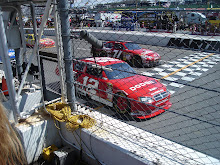I'm not the least bit surprised to find out over the weekend via Sports Illustrated that Alex Rodriguez tested positive for performance-enhancing drugs in 2003, even though he went on the record last year saying he never took any such things.
Let's face it: when it comes to the Steroid Era is baseball, no one is immune to scrutiny.
Sure, we wanted to believe A-Rod was clean, even going so far as to say he would overtake Barry Bonds' mark of 762 career home runs and return pride and glory to the game.
Instead, Rodriguez brought distrust and shame.
To be fair, A-Rod's admission to Peter Gammons in Monday's ESPN interview was a step in the right direction. Recent history had shown that guys who own up to using performance-enhancers fare better in the public eye. Jason Giambi, Andy Pettitte and Brian Roberts are all perfect examples. Each guy, upon being named in a steroids or HGH probe, came out and apologized.
Do we still rail on them? No -- we save our venom for guys like Bonds ("I never knowingly took steroids"), Roger Clemens ("You misremembered"), Mark McGwire ("I'm not here to talk about the past") and Rafael Palmeiro ("I have never taken steroids -- period").
So in that regard, A-Rod deserves kudos.
Still, the revelation proves that no one should be presumed innocent anymore. Even Ken Griffey Jr., a player I've respected since youth, isn't immune to suspicion anymore. I want to believe he's clean, that he played his career and put up Hall of Fame numbers the right way, but until someone actually proves Griffey never juiced, I have my doubts.
Everyone is at fault when it comes to the Steroid Era: the players for taking the drugs; the players' union for fighting so hard against drug testing; Major League Baseball -- specifically commissioner Bud Selig -- for allowing the union to flex its collective muscle in such a manner; the owners and general managers for turning a blind eye to their own players; and the media, for not reporting their suspicions in the height of the game's resurgence.
The union is also to blame for A-Rod's positive test becoming public. Testing in 2003 was for survey purposes only -- the league was testing to see how many players were juicing and to see if a policy in 2004 would be justified. The test was supposed to be anonymous, and the list of names of those who tested positive was supposed to have been destroyed once 2003 tests were complete.
Only that list was never destroyed. Come to think of it ... why were names even on those tests to begin with? If this was supposed to be anonymous, why figure out who juiced? Wasn't the goal simply to see how many?
If I'm one of the other 103 players to test positive in 2003, I'm nervous right now, because what's to stop some intrepid reporter from unearthing their name and dragging it through the mud as well?
A-Rod deserves credit for coming forward, but he also deserves criticism for taking the banned substances in the first place -- regardless of MLB rules at the time, such drugs were still illegal without a doctor's prescription -- just as he deserves criticism for lying to Katie Couric in last year's 60 Minutes interview.
He may not ever face suspension or jail time, but A-Rod has taken a massive PR hit, and 2009 might not be that much fun for him. But by coming clean, if Rodriguez can weather the coming storm (produce on the field, don't test positive for anything else), he might be better off for it in the long run.
He might even still make the Hall of Fame one day. Which is more than McGwire can say.
A Brutal, Devastating Reminder
14 years ago


No comments:
Post a Comment